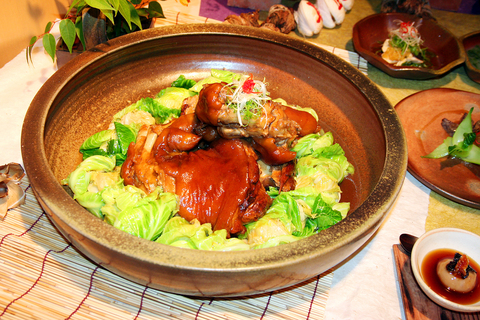"Nouveau Taiwanese cuisine" is a label that was going to stick sometime. Now that it has you can sample traditional and reinvented Hakka dishes by prize-winning chef Robin Lin (林祺豐) at the Shang Palace in the Far Eastern Plaza Hotel (台北遠東國際大飯店). The former mechanical engineering and Chinese cuisine graduate combines attention to detail and a love of food and country.
The result is a piquant and earthy style of cooking that uses local ingredients, such as clams, salty pork, Chinese cabbage, preserved turnip, intestines and fruits of the sea. Lin uses these staple foods to develop "new Taiwanese" recipes based on old formulas.
The Hakka, or "guest people," were originally from northern China, around 1,700 years ago, but settled in the south and then moved outward in a series of diasporas. Most Taiwanese Hakka settled in hilly or remote areas and typically were poor and dependant on farming. As a result their food was often preserved with salt or by pickling, in order to make the most of their seasonal harvests. It was also occasionally oily as this provided much-needed energy.

PHOTO: JULES QUARTLY, TAIPEI TIMES
This was evident in dishes such as the salty pork with preserved turnip and the spicy, salted deep-fried bomb fish. Like spice in an Indian curry or the seasoning originally used by French chefs to disguise indifferent ingredients, Taiwanese fare has evolved its own set of flavors. Preserved been curd sauce is a key element in many of the dishes and has a strong taste that would have originally given bland food some interest.
"Hakka food is generally considered to be common. Here we are making it more cultured and sophisticated so that diners can appreciate the real Hakka spirit. It is food that was originally for poor people but actually it is now considered to be good for the health and natural," Lin said.
An example of this was the clam with fried rice, wrapped with cabbage that came garnished with seaweed. The gently seasoned seaweed and clams went together perfectly and Lin explained choosing elements that complemented each other was a signature of his dishes.
Lin, who won a Hakka cuisine championship in 2005, is head chef at the renowned Hwataoyao (華陶窯) restaurant, botanical garden and ceramic studio in Miaoli County (苗栗縣). For this weeklong promotion at the Far Eastern, Lin will assist the hotel's chefs in providing nouveau Taiwanese cuisine, for the first time.

Late last month Philippines Foreign Affairs Secretary Theresa Lazaro told the Philippine Senate that the nation has sufficient funds to evacuate the nearly 170,000 Filipino residents in Taiwan, 84 percent of whom are migrant workers, in the event of war. Agencies have been exploring evacuation scenarios since early this year, she said. She also observed that since the Philippines has only limited ships, the government is consulting security agencies for alternatives. Filipinos are a distant third in overall migrant worker population. Indonesia has over 248,000 workers, followed by roughly 240,000 Vietnamese. It should be noted that there are another 170,000

Enter the Dragon 13 will bring Taiwan’s first taste of Dirty Boxing Sunday at Taipei Gymnasium, one highlight of a mixed-rules card blending new formats with traditional MMA. The undercard starts at 10:30am, with the main card beginning at 4pm. Tickets are NT$1,200. Dirty Boxing is a US-born ruleset popularized by fighters Mike Perry and Jon Jones as an alternative to boxing. The format has gained traction overseas, with its inaugural championship streamed free to millions on YouTube, Facebook and Instagram. Taiwan’s version allows punches and elbows with clinch striking, but bans kicks, knees and takedowns. The rules are stricter than the

“Far from being a rock or island … it turns out that the best metaphor to describe the human body is ‘sponge.’ We’re permeable,” write Rick Smith and Bruce Lourie in their book Slow Death By Rubber Duck: The Secret Danger of Everyday Things. While the permeability of our cells is key to being alive, it also means we absorb more potentially harmful substances than we realize. Studies have found a number of chemical residues in human breast milk, urine and water systems. Many of them are endocrine disruptors, which can interfere with the body’s natural hormones. “They can mimic, block

Next week, candidates will officially register to run for chair of the Chinese Nationalist Party (KMT). By the end of Friday, we will know who has registered for the Oct. 18 election. The number of declared candidates has been fluctuating daily. Some candidates registering may be disqualified, so the final list may be in flux for weeks. The list of likely candidates ranges from deep blue to deeper blue to deepest blue, bordering on red (pro-Chinese Communist Party, CCP). Unless current Chairman Eric Chu (朱立倫) can be convinced to run for re-election, the party looks likely to shift towards more hardline